Emmanuel Mouret Minds His Manners in Shall We Kiss?
By Diane Sippl
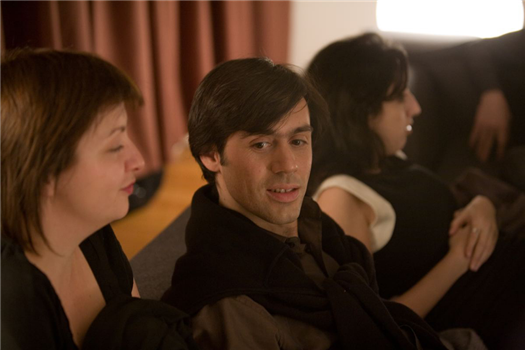
“I believe that the cinema helps give us an idea about the world, an idea about human beings. But the world and human beings are so complex and infinite… that they have to be simplified. In my mind, to simplify is to create recognizable shapes. Afterwards, the big challenge is to simplify while acknowledging the complexity.”
Writer/Director/Actor Emmanuel Mouret
With good reason, the word “finesse” comes from the French: for one thing, the Gauls are famous for finagling ways to follow their desires and manage the damage at the same time. Strategy is needed, but manner is key. And anyone familiar with The Art of Courtly Love knows that manners must grapple with morals. From Andreas Capellanus and Marie de Champagne to Molière and Marivaux to Rohmer and Truffaut, changes of heart and their attendant actions have compelled French moralists to spin tales of woe, and recently Emmanuel Mouret has joined their ranks. With Venus and Fleur, Change of Address, and now, especially, Shall We Kiss?, Mouret replays the French farce with remarkable aplomb.
Most distinctive of Shall We Kiss? is the way it romps through
the Romantic era with unabashed panache, even though the story is set in present-day
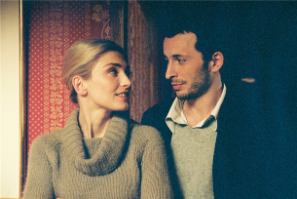

The shell of Shall We Kiss? presents a chance encounter in
These stories are choreographed as a succession of “dances” grand or sad, usually pas de deux and occasionally pas de trois, performed by the actors in their homes and hotels, museums or parks, to the score’s accompaniment, Dvořák at the beginning or Verdi at the end, but mostly Tchaikovsky and especially Schubert, whose portrait looms large throughout. Of course “dances” is not to be taken literally but figuratively; and yet as human figures, the actors are quite literally placed in position to play the games called for by their romantic pursuits. Through Martial Salomon’s editing, the film’s score makes mischief as themes from Tchaikovsky’s ballets, Swan Lake and The Nutcracker, comment on the characters’ escapades and collide with Schubert’s quartets and trios and sonatas much in the same way that the people in the paintings and etchings hung in the rooms peer at the trysts and trifles of the players. The walls may not have ears, but they have eyes, animated if only by cinematographer Laurent Desmet’s coy framing of the characters beside portraits and full-figure art works of women bathing, dreaming, seducing — and Schubert “looking,” uncannily, at our protagonists as they bumble along their way.
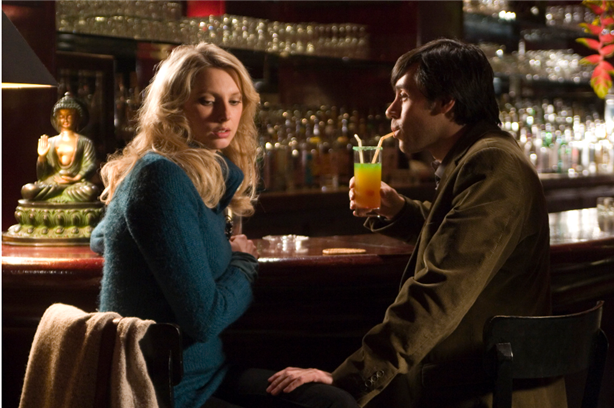
If Mouret’s script gives us stories within stories, his staging makes its own music sans music. Meticulously deploying David Faivre’s décor and Florie Vaslin’s costumes with measures of repetition and variation, Mouret crafts an effervescent rhythm. We laugh with the simple cue of the cast once again dressed to match, color-coordinated to a tee, not only with each other but with the pillows, the linens, and the woodwork. Yet the taupes and tans, beiges and browns, blacks and whites of their clothes are so classic that we often simply note how perfectly bourgeois they all are. With their symmetrical seating, proscenium framing, and sight lines that link them to the art works, the characters appear and re-appear in a procession of two-shots, nearly always from a middle distance with a stationary camera, and often with the voice-over of one them as the narrator. In rotation, they are presented as more pictures at an exhibition — until they inevitably come to life and burst their own bubbles.
“We worked a lot on the character/background relationships, as well as on the connection between the sets,” explains Mouret, because in this way “games of correspondences can be created.” But these associations bear no hidden meaning: they are there mainly “to create resonances, to take our eyes, thoughts, pleasure and complicity on a stroll.” For the most part, Shall We Kiss? is light as a cream puff, so it’s not as if we cringe at anyone’s missteps; but the players are far from insouciant, so their earnest maneuvers within a code of honor appeal to our better sensibility, and for this we are rewarded in due time.
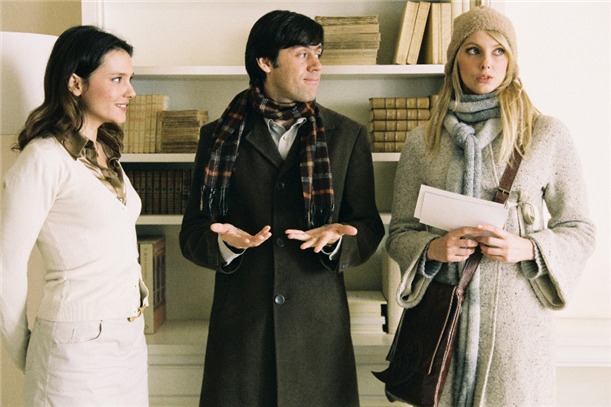
The action of the film rests on the interplay between two scientists, in a sense — one theoretical, Nicolas (Emmanuel Mouret), a math teacher; and the other more applied, Judith (Virginie Ledoyen), a laboratory researcher. As dear old friends and confidants, they put their hypothetical heads together to balance an equation: Nicolas’ recent lack of physical affection. In a protracted course of politenesses, they finally get somewhere — in fact, further than they wanted to go, at least from Judith’s point of view, since she is happily married to pharmacist Claudio (Stefano Accorsi). Judith and Nicolas find themselves playing with fire, and it’s no longer that of the Bunsen burner. This is when flight attendant Câline (Frédérique Bel), Nicolas’ short-lived girlfriend, would seem to come in handy, as a needed element for the new experiment concocted by Judith and Nicolas. Her savvy comeback to lines uttered by these two as they enlist her in their scheme — lines driven by the illicit couple’s lightweight lust — gives the ditsy blonde persona her own raison d’être.
Shall We Kiss? is as talky as it is visual and musical, but again, the talking is more about balking — at friendship, romance, and love. “The more you talk, the more you expose yourself to the other, to the gaze, to criticism,” explains Mouret, “and the more you stage yourself, the more you try to figure out how to present yourself. And that’s where a great number of stakes lie!” Can words negotiate those stakes, or will actions get the better of the whole ensemble, right down to Émilie (Julie Gayet) and Gabriel (Michaël Cohen), the impetus for the story in the first place?
Ever since Venus and Fleur, Mouret has been dubbed the heir to Eric Rohmer, but Mouret’s comedies are less literary than those of the beacon of French New Wave. Mouret may revisit the themes of the classical farce, but his approach rests more on the delivery of the dialogue than its allusions to French literary tradition. If Rohmer’s lines are the scholar’s to write, Mouret’s are the performer’s to play; and if Rohmer, once the novelist, is the moralist, Mouret, still the actor, is the mannerist.
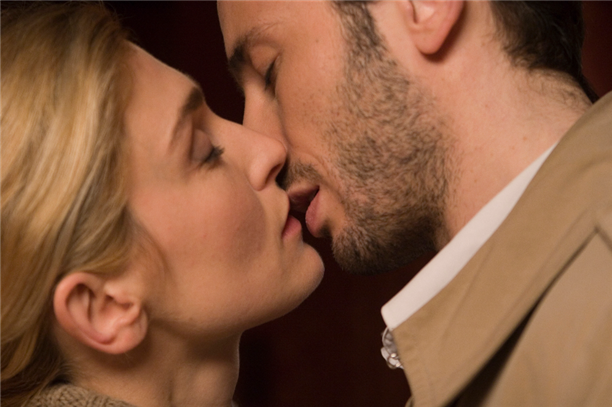
“I love these big awkward heroes like Pierre Richard,” Mouret tells us. “The clumsy person… who tries to adapt to new situations and is at the same time overwhelmed by what he’s experiencing. It’s a dimension that grabs me very deeply.” The touch of Tati in the hands of Mouret brings warmth to the performance of the entire ensemble. Ironically, in the end, it’s the characters’ capacities to fumble and fall that bring the film’s success, as Mouret the clown, the “composer,” the art connoisseur, the raconteur, does it all with nothing less than finesse.
Shall We Kiss?
Director: Emmanuel Mouret; Producer: Frédéric Niedermayer; Screenplay: Emmanuel Mouret; Cinematography: Laurent Desmet; Sound: Maxime Gavaudan; Editor: Martial Salomon; Art Director: David Faivre; Costumes: Florie Vaslin.
Cast: Virginie Ledoyen, Emmanuel Mouret, Julie Gayet, Michaël Cohen, Frédérique Bel, Stefano Accorsi, Mélanie Maudran, Marie Madinier, Luciana de Vogüe.
Color, 35mm, 102 minutes. In French with English subtitles.